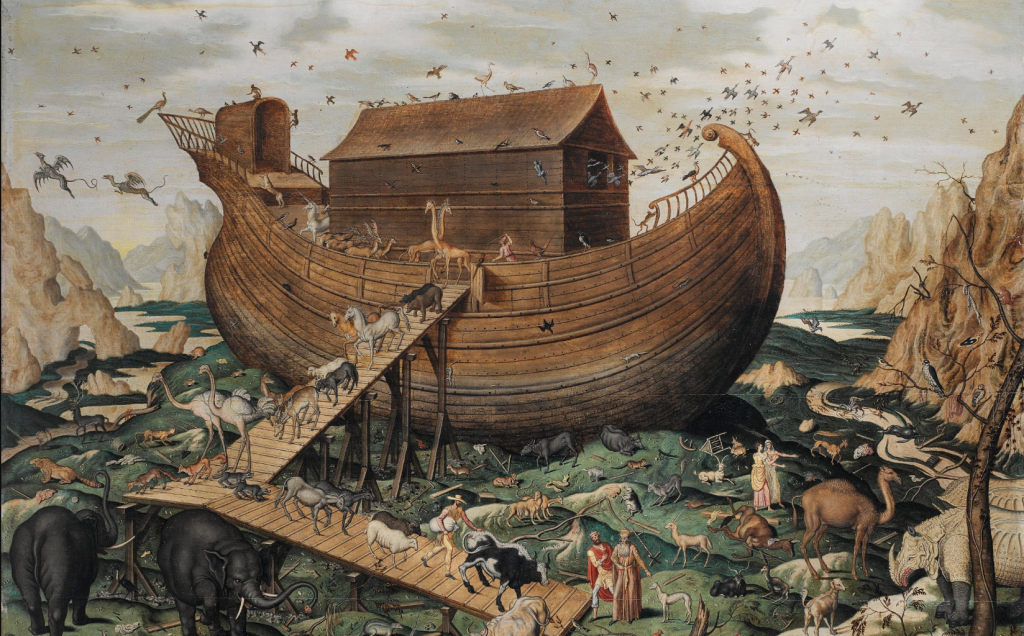

Reading Genesis with Marilynne Robinson
Reading Genesis by Marilynne Robinson. Farrar, Straus and Giroux, 2024. 352 pp., $29.00
When reviewing a work, I make a rule not to read any other reviews that might bias my thinking on the work in question. In the case of Reading Genesis, though, it was impossible to avoid the hot takes. I saw Phil Christman’s summary of his review—”the Queen has done it again”—before I could close the window. At the same time, my feed showcased some biblical studies folks clutching their collective pearls at the offenses leveled at discourse-community norms for Bible scholarship.
Like the Bible scholars, I have myself been put off at times by Robinson’s unwillingness to bow at the altar of footnotes. (While reading one of her earlier non-fiction collections I confess that I said aloud, “Where are her sources?!” and almost stopped reading.) And yet, akin to other adorers, I am so enamored of Robinson’s work that I once declined to dine with her when I had the chance, counting myself unworthy of her time.
Buffeted by boundless offense on the one side and boundless adoration on the other, both of which may end in a failure to read, I suspect that Reading Genesis is most helpful when readers work with and in the author’s ways. Early in the book, Robinson reveals that largeness of claim is her mode. She is trying to do something large because Genesis itself is doing something large: “Large assertions are made in the text, for example, that the reality we experience had a beginning, an idea disputed by major scientists into the twentieth century. An emergent universe brings innumerable mysteries, scientific as well as theological.”
Robinson feels that the way we in our shrunken days study, in the aftermath of the hermeneutic of suspicion and “self-protectiveness,” has “disabled interpretation and that has generalized into an abandonment of metaphysics as a legitimate mode of thought.” “It is striking,” she writes, “how the scale of thought has contracted with the loss of serious theology. A contemporary Kant or Hegel would find little purchase in the vocabulary of thought allowed to us now.” She redresses this problem with a large, rangy metaphysical book about a large, rangy, metaphysical book—both, alas, without footnotes.
Some of the large ideas that Robinson points out in the text of Genesis will feel necessary and familiar to a certain sort of Christian reader—expectable and possibly relieving. To Robinson, Genesis offers a story of the following: good God; good creation; many declensions of human practice away from God’s way of righteousness; a promise of God not to abandon creation but instead to bless all of it through the work of one family. And readers may also be familiar with the methodology she employs. Not only have scholars (as Robinson remarks in her text) been reading Enuma Elish next to Genesis for one hundred and fifty years; laypeople who listen to Bible Project have been reading in this way in the last decade, too, so it feels neither theologically sketchy nor innovative to do so, for a certain sort of reader.
Yet one doesn’t read Robinson’s Reading Genesis to simply affirm that she, like Christian radio, may be safe for the whole Christian family, and there are plenty of her readers to whom the above may not feel safe at all. But for those for whom some of it seems simply standard, how is Genesis made more vivid through this work?
The book’s refreshing power came for me when one of the large ideas simply hit differently when I said YES to her invitation to think largely and let the text and Robinson work on me through reflection. For example, the first sentence of Reading Genesis offers the following big idea: “The Bible is a theodicy, a meditation on the problem of evil.” This line felt as powerful to me as Emily Wilson’s translation of the first line of Homer’s Odyssey, “Tell me about a complicated man.”
It’s such a broad claim—and how might we prove it? I realized that I had been thinking of the Bible as the basis of theology, or maybe as a necessary guard rail for theology, rather than as a work by Spirit-filled people trying to figure out God. My ideas weren’t necessarily wrong, but to allow myself to think of it this way, as the work of Spirit-filled people wrestling with the problem of evil, increased vastly my interest in and respect for the biblical text’s authors, who, it turns out, may be asking large questions, related to Robinson’s and to my own.
Another example: One of the big ideas Robinson sees in Genesis is the centrality of the human to the created order, a hobby horse for Robinson. She reads creation as designed for our pleasure and sees human ability to wreck that pleasurable beauty as evidence of our importance: “Theologically speaking, the possibility that, however obscure we think we are, we can be or refuse to be the agents of great harm, seems brilliantly designed to make anyone at all a significant moral actor.” Even the tower of Babel reflects this reality: “The Lord sees neither failure nor frustrated intention nor a hastening of presumption in the tower and its destruction but potential for human success in doing the impossible. This is an astonishingly high estimate of human capability.” Letting these big ideas in Reading Genesis simmer can be helpfully reinvigorating in reflecting how one’s own story may join the biblical story.
The trick in reading Reading Genesis is to take the big statement—say, “Not much has been done in our period to magnify the Lord, maker of heaven and earth, or to enlarge our imagination to begin to comprehend the Godhead as an idea”—and let offense at the scope of the claim slip off. Then, consider what the lack of the magnification of the Lord might look like in our spheres—and what the reinvigoration of the magnification of the Lord might be. Such thinking does tend to pertain where we allow it to. Apart from its provability (and this Robinson declines even to attempt), reflection on it might offer just the sort of edification I need, say, in my second job as a worship leader at a small church in our town, or less obviously but possibly more profoundly in my third job as a farmer—not to mention the first job of the literature professor.
But Robinson reads even more rangingly—and her novelist-bred, character-focused reading methods can likewise refresh our reading, should we open ourselves to them. Robinson builds out the sparse narration of Genesis through reconstitution of characters, many of which have long read differently to me. I found myself horrified at Robinson’s judgment of Rebekah. Robinson sees the text showing and telling the portrait of a thoroughly non-admirable person: Rebekah’s athletic feat of water drawing is “fair to interpret as excitement at all this”; she “alone in Scripture, laments the discomforts of her pregnancy”; she puts “the covenant succession at great risk, having contrived a scheme that will play cruelly on the helplessness of Isaac’s old age”; she is bitter, determined, miserable, in existential despair.
“It is hard,” writes Robinson, “to imagine a wife and mother of any sort more profoundly disruptive to her family” for “there is really no evidence that she loved anyone.” Well, I knew and know that I’m not supposed to view the characters of Genesis as heroic, but this still prompted significant meditation. Robinson heads off my criticism at the pass when she writes “if it is bad feminism to say that Rebekah’s liveliness and vigor turned to resentment, scheming, and manipulation, her role in this seeming disaster was providential. The very mingled characters in Genesis, in the fact of their flaws and errors, should give hope to us all.” A fair point.
Rather than a scholarly commentary built on decades of the highest bibliographic scholarship, or a popular, revisionist reading of an often-read work, Reading Genesis is one author’s write-through of the first book of the Bible in light of a life of wide reading and wide writing. It might be like the sort of thing someone does as preparation for teaching a Sunday school class (which Robinson has done) or giving a sermon.
Well, except that this person is matchlessly literate and thoughtful. When she writes, as she often does, “This is remarkable,” it is because she has read and written her way into the belief that one may have permission to mark as significant a feature of Genesis, lo, these millennia later, even outside the discourse of the scholars. One may—armed with one’s Jewish Publication Society Hebrew Bible, a copy of the Enuma Elish, and idiosyncratic, heuristic reading of some alas unnamed but available scholarship from any period of study—emerge with large, theological ideas and character studies that are breathtakingly usable. But she reads the Old Testament beside the New without embarrassment—and European history and literature next to both. This unembarrassed willingness to walk between silos, is not only refreshing. Heard aright, it is sermonic. And transformational.
Of course, as with a sermon, there are plenty of moments at which audience members might quibble. When reading, for example, “Isaac is named by his mother, remembering her laughter and the improbable joy that still makes her laugh,” I started to flip around. Genesis 17:19 says Isaac was named by God, and 21:3 says Abraham named him. But I stopped almost at once, for where does this kind of nitpicking get a reader? Not far. Not that accuracy is unimportant, but Robinson’s reading underscores the reflection-worthy, interesting thing: she shows us how Isaac AND Ishmael, both named with naming stories, are loved and protected and the object of divine rescue in the text. Such a reading does rather prompt some rethinking of spurious footnotes to the opening line of Moby Dick, does it not?
Take this one: “Righteousness is a very important word in Scripture, too little considered by interpreters, perhaps.” I know—thank goodness for the “perhaps”! But it might have been a while since the mind has lighted upon that particular angle. In Robinson’s righteousness-based reading of Noah’s ark, we may see a God who cares about righteousness rather than merely the God willing to destroy the world he made. This reframing makes Genesis imaginable, even encouraging: “Righteousness is associated with life not doomed to destruction. It can save a city. It can save Creation. If one could imagine righteousness breaking out in earth’s saddest places, and among the exploiters of violence and poverty, one could anticipate the stable, long-term flourishing of something that deserved to be called life.”
It is the work of a good preacher or novelist to make such a world—a pearl of not inconsiderable price—vividly possible and manifest through dubious characters and their plots. Footnotes may help, of course, but they really may not.
Tiffany Eberle Kriner is Associate Professor of English at Wheaton College. She is the author of The Future of the Word: An Eschatology of Reading (Fortress, 2014) and In Thought, Word, and Seed: Reckonings from a Midwest Farm (Eerdmans, 2023).
Image: Simon de Myle, Noah’s Ark on Mount Ararat